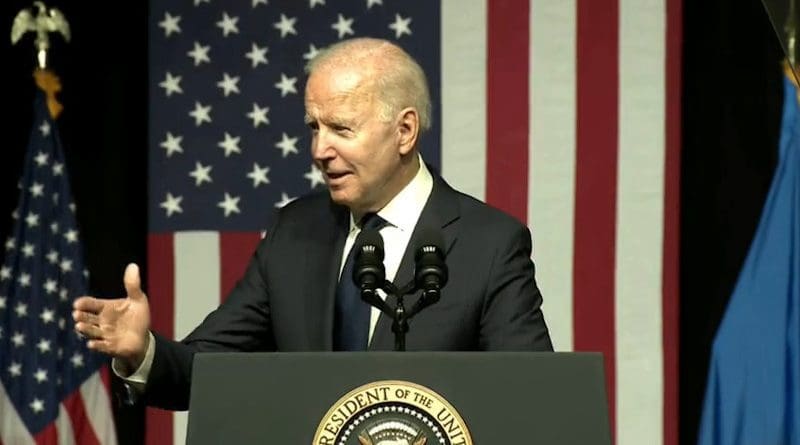Just How Does Biden Differ From Trump On Palestine? – OpEd
By Ramzy Baroud
When Joe Biden was declared the winner of the US presidential election last November, expectations in Ramallah were high. A Biden administration, in contrast to the brazenly pro-Israel Trump leadership, would surely be much fairer to Palestinians, the thinking went at the time.
Unsurprisingly, Palestinian Authority President Mahmoud Abbas was one of the first leaders to enthusiastically congratulate Joe Biden. In contrast, then-Israeli Prime Minister Benjamin Netanyahu waited a relatively long time before offering his congratulations, hoping, perhaps, that his close friend and staunch political ally Donald Trump would succeed in reversing the outcome of the poll.
Almost a year later, however, one struggles to understand the Palestinian euphoria of last year and the absence of criticism of the current US administration for failing to reverse most of the pro-Israel decisions enacted by Trump. The latter’s unwarranted steps included the recognition of Jerusalem as Israel’s capital and the relocation of the US Embassy from Tel Aviv to Jerusalem, in violation of international law.
So why does the PA leadership remain largely silent regarding the fact that the Biden administration, despite its rhetoric about peace and dialogue, maintains the same degree of commitment to Israel as Trump did? The short answer is money.
Indeed, the only tangible step that the Biden administration has taken in the past year has been the restoration of funds that Trump withheld from the Palestinians, thus reversing a nearly 30-year US policy of — together with other “donor countries” — bankrolling the PA.
On the political front, there is little else to report. The Palestine Liberation Organization office in Washington, although expected to be reopened by Biden after its abrupt closure by the Trump administration in September 2018, remains closed. Additionally, the US Consulate in East Jerusalem, which was also shut down by a Trump decision, remains “a major point of contention” between Israel and the US, according to the US news website Axios.
As soon as the Biden administration declared its intention to reopen its mission in Palestine, top Israeli officials poured into Washington to prevent even this symbolic Palestinian gain from taking place. Israeli Prime Minister Naftali Bennett raised the issue with Biden during their White House meeting in August, requesting that he refrain from carrying out such a move and, instead, open the consulate in Ramallah, the Times of Israel reported.
In September, Israeli Foreign Minister Yair Lapid warned Washington that reopening the US mission in East Jerusalem was a “bad idea,” alluding that such a decision could lead to the collapse of Israel’s fragile coalition.
The subject also topped the agenda of US Secretary of State Antony Blinken and Lapid during their meeting in Washington this month. “I don’t know how to hold this coalition together if you reopen the consulate,” Lapid told his US counterpart, according to Israeli officials and as reported by Axios.
To avoid a confrontation and to buy time for the Israeli government, Blinken proposed a committee made up of US and Israeli officials to “discuss the issue with maximum discretion.”
The Israeli government is using the current fractious ruling coalition as a pretense to defer the US decision on the consulate, hinting that if the US moves the embassy before the government budget passes in November, the government will dissolve, thus ushering in the ominous possibility of Netanyahu’s return.
It is expected that the joint US-Israeli committee will not be formed until the budget vote, and even then it is unclear if Washington will succeed in persuading Israel to respect Biden’s decision.
Notably, while the matter of the consulate should concern Palestinians most, no Palestinian official will be included in the exclusive and secretive Blinken-Lapid talks. More bizarrely, the PA does not seem to mind, as we are yet to witness a public outcry by Abbas and his officials. This is, of course, typical PA behavior, for as long as US funds are again finding their way to PA coffers, all other issues seem to be of little or no urgency.
However, even if a political compromise is found and a US Consulate finally re-established, how will this alter the reality on the ground?
Since 1994, the US Consulate has served a largely symbolic role, one that mattered most to the PA. It hardly altered the political equation on the ground in favor of Palestinians. In a telling and surreal reference to the consulate, Noga Tarnopolsky wrote in the Los Angeles Times in 2019: “The consulate was known for hosting one of the liveliest parties on Jerusalem’s annual schedule, a July 4 gala held on the front lawn.”
A short distance away from the scene of these parties, hundreds of Palestinian families are either being evicted or face the risk of eviction by the US-funded Israeli police and army. Meanwhile, a bit farther away, Israel’s apartheid wall continues to segregate occupied Palestine on the basis of race, ethnicity and religion. One is justified, then, in believing that the reopening of the US mission would do little to change this horrific status quo.
The Biden administration is proving to be nothing but a facade for the same policies enacted by the Trump leadership. But this time the PA, for self-serving reasons, does not seem to mind.

